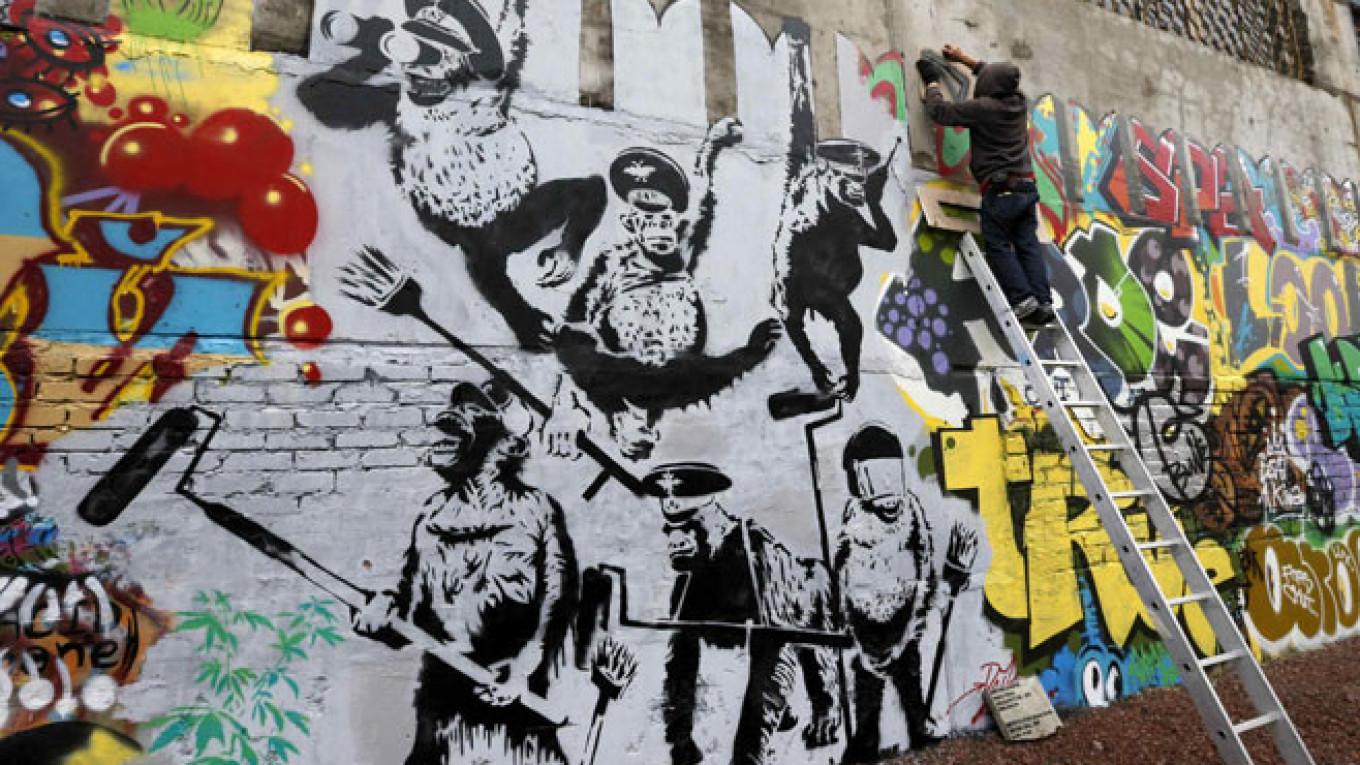ST. PETERSBURG — “We Need to Change the System” appears on the screen as a pair of fangs fill the screen. A fluffy tail swishes by, and the phrase “Can cats change the system?” pops up.
Imported by Elizabeth I to control the mice population, cats have resided in basement of the building since 1745. At one time they had their own servants and an annual stipend. Now, they are fast becoming the stars of Manifesta 10, the contemporary art biennial, which opened last week.
Dutch artist Erik van Lieshout’s installation “Basement” includes a film based on his nine-week adventure in the Winter Palace’s basement building better facilities for the felines. To view the film one enters an air-hole punctuated tunnel plastered with semi-political marker-pen poster collages. On one is a picture of a finger shooting Putin. “What is a museum?” is scrawled on a piece of paper, “a shrine, or a factory?”
Van Lieshout’s installation is one of 55 artworks dotted around the Hermitage, neither shrine nor factory until the end of October when Manifesta closes.
Set up 20 years ago, Manifesta, a roving biennial, often sees its exhibitions in abandoned buildings or industrial locations, but here it is among the grand columns and extravagant interiors of Russia’s grandest museum.
Look in the yard, and you will see a Lada crashed into a tree, the final leg of Francis Alÿs’ journey from Brussels to St. Petersburg. Alÿs followed a trip he made 30 years before with his brother, although they never made it to Russian then.
One of the most spectacular is Thomas Hirschhorn’s Abschlag Towers, a building that has lost its facade as its top two stories slide into a courtyard, like the aftermath of a gas explosion or after a bombing. Visitors can peer into the apartments and from afar see works that have been taken from the Hermitage’s walls — by the likes of Kazimir Malevich — and hung on walls.
It is the largest international contemporary art event to take place in Russia at a time when the country’s government, at least, seems to be increasingly antagonistic to exactly the kind of art on show.
Thousands signed a petition for the festival to be moved from Russia in the wake of 2013 anti-gay propaganda legislation and the Ukraine-Russia conflict. Polish sculptor Pawel Althamer and local art collective Chto Delat, or “What is to be done,” withdrew from the event.
Curator Kasper König said the festival came very close to being canceled a few weeks before the start, in an interview with Deutche Welle, adding that, “It became clear to me that I was working in a country where there is no civil society.”
He was more diplomatic in the festival’s catalogue, saying, “The location and timing has meant the biennial’s execution is delicate.”
Notably, Mikhail Piotrovsky, head of the Hermitage, felt he had to say at a news conference at the start of the festival that no laws had been broken in the exhibit.
The main achievement of Manifesta is the fact that it took place, wrote Kommersant critic Kira Dolinina.
One wall in the Hermitage may indeed provoke comment from Vitaly Milonov, the St. Petersburg politician who first pushed the anti-gay legislation. South African artist Marlene Dumas’ monochrome watercolors are of 16 gay men, including Pyotr Tchaikovsky and Sergei Diaghilev, in an exhibit called “Great Men.”
A quote from Tchaikovsky accompanies his picture: “Nothing is more futile than wanting to be anything other than what I am by nature.” Other great men in the series include Alan Turing, James Baldwin and Anton Krasovsky, a television journalist who was sacked after he came out.
Manifesta has spread far and wide throughout St. Petersburg. Outside of the Hermitage, there is huge parallel program, with events such as Casus Paci, where 60 street artists from Russia and Ukraine take a look at World War I. Younger, less established artists can be seen at the Manezh Corpus Kadetskogo, including Maria Rozhkova’s photos of empty schools and kindergartens on the eve of Sept. 1, the first day of school.
The festival is also accompanied with a series of lectures and free group tours available in English and Russian.
Manifesta 10 runs till Oct. 31. Venues all over St. Petersburg. www.manifesta.org.
Contact the author at [email protected]
A Message from The Moscow Times:
Dear readers,
We are facing unprecedented challenges. Russia's Prosecutor General's Office has designated The Moscow Times as an "undesirable" organization, criminalizing our work and putting our staff at risk of prosecution. This follows our earlier unjust labeling as a "foreign agent."
These actions are direct attempts to silence independent journalism in Russia. The authorities claim our work "discredits the decisions of the Russian leadership." We see things differently: we strive to provide accurate, unbiased reporting on Russia.
We, the journalists of The Moscow Times, refuse to be silenced. But to continue our work, we need your help.
Your support, no matter how small, makes a world of difference. If you can, please support us monthly starting from just $2. It's quick to set up, and every contribution makes a significant impact.
By supporting The Moscow Times, you're defending open, independent journalism in the face of repression. Thank you for standing with us.
Remind me later.


